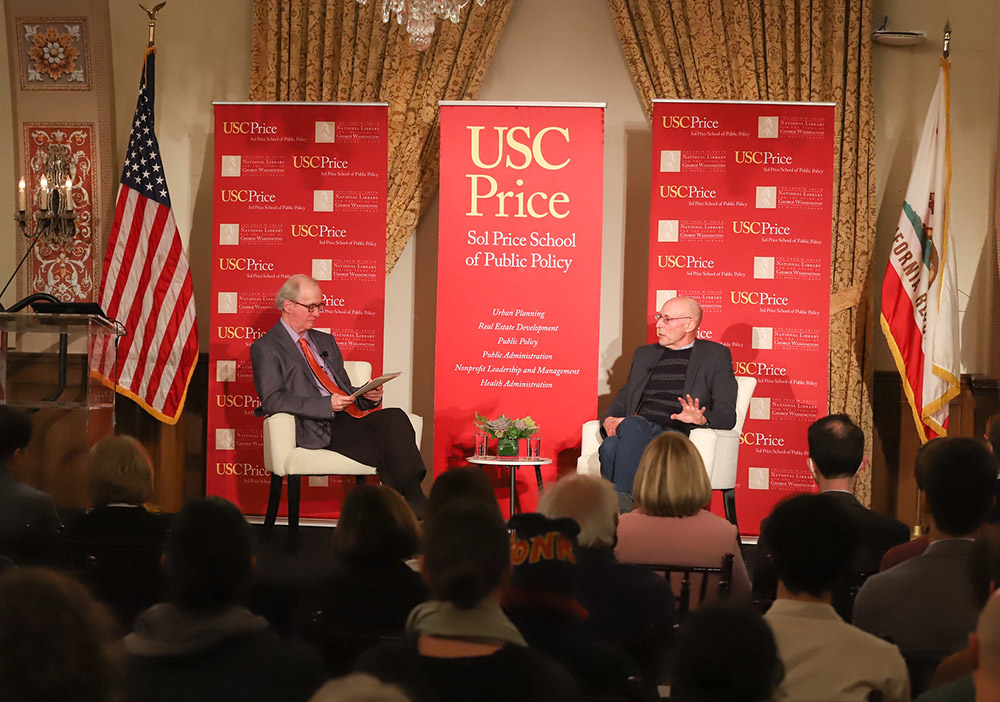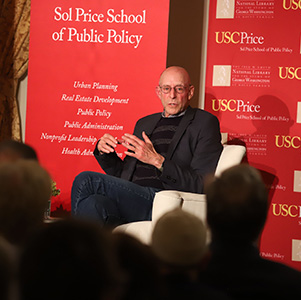Food for thought: Michael Pollan reflects on Americans’ complicated relationship with food

Highlights:
- Michael Pollan, author of The Omnivore’s Dilemma, was the featured speaker at the annual George Washington Leadership Lecture Series held at USC on March 21.
- President George Washington’s deepest passion was agriculture, and he helped introduce the idea that agriculture could be sustainable over time.
- Our current agricultural policies of subsidizing corn and soy are making Americans sick, according to Pollan, who says the 2023 Farm Bill is a major opportunity to change course.
“Eat food. Not too much. Mostly plants.”
The advice is familiar to the millions of readers around the world who have devoured Michael Pollan’s best-selling books, including “The Omnivore’s Dilemma,” “Food Rules” and “In Defense of Food: An Eater’s Manifesto.”

Pollan, an author, journalist and professor at Harvard University and UC Berkeley, has famously argued that the ultra-processed corn- and soy-based products in most supermarkets and fast-food restaurants isn’t, in fact, food – and suggests that if his grandmother’s generation wouldn’t recognize it as food, you’re better off not eating it. (Sorry, fans of Flaming Hot Cheetos).
On March 21, Pollan addressed a crowd of USC students, faculty and alumni – along with enthusiastic readers of his books – as part of the George Washington Leadership Lecture Series sponsored by the USC Sol Price School of Public Policy and the Fred W. Smith National Library for the Study of George Washington.
Douglas Bradburn, President and CEO of George Washington’s Mount Vernon and a well-known scholar of early American history, set the stage with opening remarks about Washington’s “deepest passion” – agriculture.
The first U.S. president “transformed Mount Vernon from a tobacco plantation into a wheat farm,” bringing in new crops and grains and experimenting with crop rotation to boost soil health, Bradburn said.
Washington helped introduce the idea that “lands could be restored; that you could have a regime of agriculture which was sustainable over time,” said Bradburn – notions that resonate with the modern organic and regenerative farming movement and climate activists.
America’s agricultural policies lead to major health challenges, Pollan argues
But Washington wouldn’t recognize our nation’s current approach to agriculture, which Pollan described as “locked in” by policies that incentivize growing corn and soy. In Washington’s time, Pollan said, “there was not this impediment, which is the whole structure of agricultural policy and subsidies.”
“So, what is the problem with that, besides the fact that we’re losing all this wonderful topsoil because of the way we’re farming?” he asked before answering, “It’s that corn and soy are the building blocks of the Western diet, which gives us chronic diseases that are killing us.”
Cardiovascular disease, stroke and diabetes, along with many types of cancer, are all linked to this diet. “The Western diet consists largely of lots of meat, lots of processed food, very few vegetables, very little whole grain. We have plenty of science showing us what’s wrong with that,” Pollan said. “I don’t think we fully appreciate how much the way we’re eating is ruining our health and shortening our lives.”
Pollan says the public health crisis requires new approaches to policy
Pollan described new research into the dangers of ultra-processed food, produced in factories and loaded with hard-to-pronounce ingredients that are engineered to make us find it irresistible and eat too much of it. It’s not just the fat, salt and sugar in the foods we love that are the problem: a frozen pizza made in a factory, full of chemicals and emulsifiers, is far worse for your health than one you’d make in your own kitchen, he said.
“This is a public health crisis, and it doesn’t get treated that way,” he said, but it can be addressed with changes in the way Americans eat and in the way we subsidize agriculture. “We, as a nation, create incentives for farmers. Farmers will follow the incentives.”
The most important opportunity to change policy, he said, is the 2023 Farm Bill, a nearly $1 trillion spending package that sets authorized funding levels for the next five years and which Pollan described as typically controlled by big agricultural interests.
“That’s where we should put a lot of our political muscle,” Pollan said. “Unless you change the system, you’re not going to be able to tackle obesity and Type 2 diabetes. You’re not going to be able to tackle food insecurity in urban areas.”
Ultimately, we should look beyond agricultural and farming policies and create a national food policy, he said.
“There are 2 million farmers in America. It’s a very important occupation. But what we need to be concerned with is the thing that all 300 million of us do, which is eat food,” argued Pollan. “We have to get that right and then we should design farm policies that support the kind of food we want to eat.”
In other words, policies that would support Americans eating food. Not too much. Mostly plants.
The lecture was moderated by USC Price School Professor and Chair of the Department of Urban Planning and Spatial Analysis David Sloane. The George Washington Leadership Lecture Series was established through a gift by Maribeth Borthwick (’73), vice regent for California of the Mount Vernon Ladies’ Association, the non-profit that preserves and maintains the Mount Vernon estate originally owned by Washington’s family.
Watch the video highlights of “Food for Thought”, or the entire lecture, here.
The full set of photos can be seen here.
Related faculty

David Sloane
Professor
Chair, Department of Urban Planning and Spatial Analysis